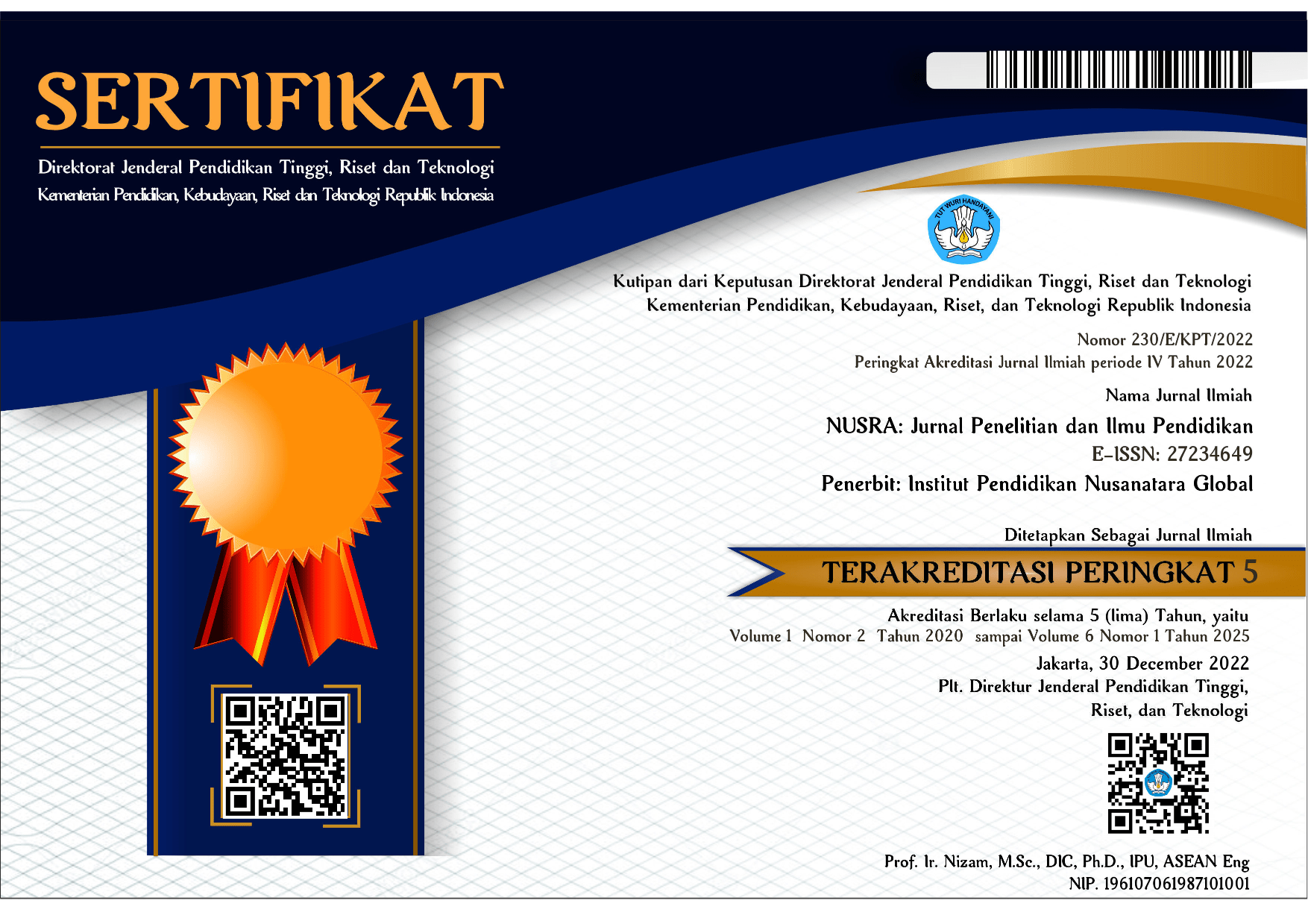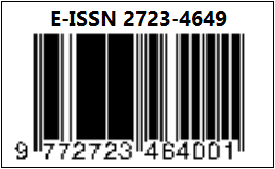The Effect of Using Edpuzzles in Teaching Vocabulary
DOI:
https://doi.org/10.55681/nusra.v5i2.2618Keywords:
Edpuzzle Application, Vocabulary Learning, English Language EducationAbstract
This study investigates the effectiveness of using the Edpuzzle application in improving students’ vocabulary knowledge and understanding in English language learning. An experimental design was employed with pre- and post-tests conducted on seventh-grade students from SMP 1 Parongpong, Jawa Barat. The experimental group utilized Edpuzzle, while the control group employed conventional teaching methods. Data were analyzed using descriptive statistics, normality tests, and paired sample t-tests. The results indicate a significant improvement in vocabulary knowledge among students who utilized Edpuzzle. The post-test scores (M=68.92) were substantially higher than the pre-test scores (M=41.97), demonstrating the effectiveness of Edpuzzle in enhancing students’ vocabulary skills. However, challenges such as limited access to technology and unstable network connectivity were identified as factors influencing the extent of vocabulary improvement. In conclusion, integrating Edpuzzle into language teaching practices holds promise for enhancing vocabulary learning outcomes and engaging students in active learning experiences.
Downloads
References
Abou Afach, Sara, et al. “How to Enhance Awareness on Bullying for Special Needs Students Using “Edpuzzle” a Web 2.0 Tool.” International Journal of Educational Research Review, vol. 3, no. 1, 1 Jan. 2018.
Ary, D., Jacobs, L. C., Razavieh, and Sorensen, C. Introduction to research in education. Wadsworth Cengage Learning. “APA PsycNet.” Psycnet.apa.org, 2010, psycnet.apa.org/record/1973-21680-000. Accessed 28 Mar. 2024.
Brown, H. Douglas. Principles of Language Learning and Teaching: A Course in Second Language Acquisition. Thuvienso.hoasen.edu.vn, Pearson, 2014.
Chen, H., & Chen, L. (2022). Exploring the effectiveness of Edpuzzle in flipped language learning: A mixed-methods study. Computer Assisted Language Learning, 1-23.
Burns, Anne. Doing Action Research in English Language Teaching. Routledge, 4 Dec. 2009.
Fernández Carril, Raquel. “I.S.P. Nation, Learning Vocabulary in Another Language. Cambridge: CUP, 2001, 417p.” Revista Alicantina de Estudios Ingleses, no. 15, 2002, pp. 292–295.
García, M., & Ramírez, J. (2023). Enhancing vocabulary instruction through Edpuzzle: A case study. Journal of Educational Technology & Society, 26(2), 173-185.
Geja, J. (1992). Dictionary of educational measurement, testing, and evaluation. Journal of Educational Assessment, 45(2), 154–168.
Hasan, Hasan. “Improving Student's English Vocabulary by Using Tic Tac Toe Game in the Second Year of SMP Negeri 7 Satap Maiwa Kabupaten Enrekang.” Edumaspul - Jurnal Pendidikan, vol. 2, no. 2, 31 Oct. 2018, pp. 77–86, https://doi.org/10.33487/edumaspul.v2i2.12. Accessed 10 Jan. 2021.
López, A. et al. (2024). The impact of Edpuzzle on vocabulary acquisition: A quasi-experimental study. Language Teaching Research, 1-20.
M.E, Aurer, and Tsiatsos T. “Google Books.” Books.google.com, books.google.com/books?hl=en%5C&lr=%5C&id=wRBMDwAAQBAJ%5C&oi. Accessed 16 Jan. 2024.
Marwa, Marwa, et al. “Intercultural Topics in the Indonesian English Language Teaching Classroom: Contextualizing Local and Neutral Cultures to Target and Global Cultures.” Journal of Intercultural Communication, vol. 21, no. 1, 30 Mar. 2021, pp. 34–45, https://doi.org/10.36923/jicc.v21i1.4. It was accessed on 26 Sept. 2022.
Mishra, S. (2005). “Interactive Multimedia in Education and Training.” Interactive Multimedia in Education and Training. Interactive Multimedia in Education and Training, 2005, https://doi.org/10.4018/978-1-59140-393-7.
Nation, I. S. P., & Webb, S. (2020). Teaching and learning vocabulary. Routledge.
Otair, Ibrahim, and Noor Hashima Abd Aziz. “Exploring the Causes of Listening Comprehension Anxiety from EFL Saudi Learners’ Perspectives: A Pilot Study.” Advances in Language and Literary Studies, vol. 8, no. 4, 31 Aug. 2017.
Schmitt, N. (2021). Vocabulary in language teaching. Cambridge University Press.
Sugiyono. (2012). Metode Penelitian Kuantitatif, Kualitatif, dan R&D. Alfabeta.Nation, P. “The Cambridge Applied Linguistics Series.” Cambridge University Press, Cambridge University Press, 2022, www.cambridge.org/core/books/abs/learning-vocabulary-in-another-language/cambridge-applied-linguistics-series/835A160179EA87DD3F6E6CBFA9CEA08D. Accessed 5 Feb. 2023.
Ustunbas, O. “Applications Used in Distance Education in English Language Education.” Journal of English Teaching, vol. 7, no. 3, 2021, pp. 260–272, files.eric.ed.gov/fulltext/EJ1322133.pdf, https://doi.org/10.33541/jet.v7i3.3027. It was accessed on 30 Mar. 2022.
Downloads
Published
How to Cite
Issue
Section
License
Copyright (c) 2024 Erica Setiyo Rini, Marlin Steffi Marpaung

This work is licensed under a Creative Commons Attribution-ShareAlike 4.0 International License.














